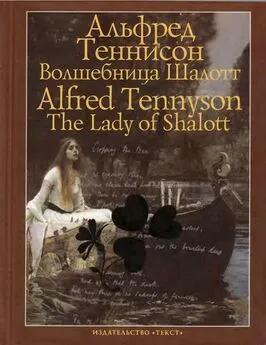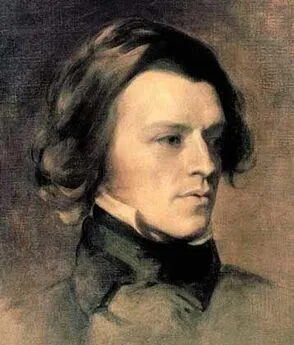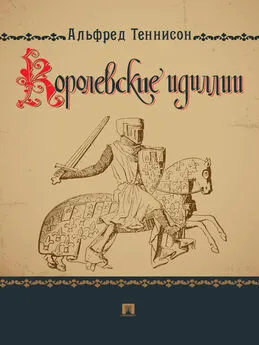Альфред Теннисон - Волшебница Шалотт и другие стихотворения
- Название:Волшебница Шалотт и другие стихотворения
- Автор:
- Жанр:
- Издательство:Текст
- Год:2007
- Город:М.
- ISBN:978-5-7516-0570-5
- Рейтинг:
- Избранное:Добавить в избранное
-
Отзывы:
-
Ваша оценка:
Альфред Теннисон - Волшебница Шалотт и другие стихотворения краткое содержание
Прославленный автор викторианской эпохи Альфред Теннисон (1809–1892) в двадцатом веке претерпел критические гонения, которые тем не менее не смогли перечеркнуть значение его поэзии в мировой литературе. Эпическая поэма Теннисона о короле Артуре «Королевские идиллии» породила настоящую «артуроманию» в английском искусстве, не затихающую до наших дней. К сожалению, русскому читателю известно скорее имя Теннисона, нежели его стихи. Благодаря В. Каверину миллионам читателей запомнилась строка из его «Улисса»: «Бороться и искать, найти и не сдаваться», да у любителей поэзии на слуху восклицанье Мандельштама: «Леди Годива, прощай… Я не помню, Годива…» Данная книга, по сути — первое серьезное издание стихотворений Альфреда Теннисона в России. Оно подготовлено известным поэтом и исследователем англоязычной поэзии Г. М. Кружковым в сотрудничестве с молодыми переводчиками.
Волшебница Шалотт и другие стихотворения - читать онлайн бесплатно полную версию (весь текст целиком)
Интервал:
Закладка:
Г. Кружков
FROM IN MEMORIAM A. H. H
ИЗ ЦИКЛА «IN MEMORIAM»
V
I sometimes hold it half a sin
To put in words the grief I feel;
For words, like Nature, half reveal
And half conceal the Soul within.
But, for the unquiet heart and brain,
A use in measured language lies;
The sad mechanic exercise,
Like dull narcotics, numbing pain.
In words, like weeds, I’ll wrap me o’er,
Like coarsest clothes against the cold:
But that large grief which these enfold
Is given in outline and no more.
V
Порой мне кажется: грешно
Писаньем горе умножать —
Как будто полуобнажать,
Что прикровенным быть должно.
И если сызнова пишу,
То лишь затем, что я таким
Занятьем истово тупым,
Как опиумом, боль глушу.
И, чтобы спрятать скорбь свою
И холод жизни обмануть,
В дерюгу слов укутав грудь,
Я здесь, как чучело, стою.
Г. Кружков
VII
Dark house, by which once more I stand
Here in the long unlovely street,
Doors, where my heart was used to beat
So quickly, waiting for a hand,
A hand that can be clasp’d no more —
Behold me, for I cannot sleep,
And like a guilty thing I creep
At earliest morning to the door.
He is not here; but far away
The noise of life begins again,
And ghastly thro’ the drizzling rain
On the bald street breaks the blank day.
VII
Дом пуст. К чему мне тут стоять
И у порога ждать теперь,
Где, прежде чем ударить в дверь,
Я сердце должен был унять?
Укор вины, укол тоски;
Взгляни — я не могу уснуть,
Бреду в предутреннюю муть
Вновь ощутить тепло руки,
Которой нет… Тебя здесь нет!
Но снова слышен скрип забот,
И в мокрой, серой мгле ползет,
Как привидение, рассвет.
Г. Кружков
XI
Calm is the morn without a sound,
Calm as to suit a calmer grief,
And only thro’ the faded leaf
The chestnut pattering to the ground:
Calm and deep peace on this high wold,
And on these dews that drench the furze,
And all the silvery gossamers
That twinkle into green and gold:
Calm and still light on yon great plain
That sweeps with all its autumn bowers,
And crowded farms and lessening towers,
To mingle with the bounding main:
Calm and deep peace in this wide air,
These leaves that redden to the fall;
And in my heart, if calm at all,
If any calm, a calm despair:
Calm on the seas, and silver sleep,
And waves that sway themselves in rest,
And dead calm in that noble breast
Which heaves but with the heaving deep.
XI
Как тихо, Господи, вокруг!
Такая тишь среди полян,
Что, если падает каштан,
Слой листьев поглощает звук.
Тишь в поле. Зябкою росой
Калины каждый лист омыт;
И паутину золотит
Зари осенней луч косой.
Тишь в воздухе, ни ветерка;
Недвижный лес день ото дня
Пустей. И в сердце у меня
Покой и мертвая тоска.
Тишь, как туман, у ног течет,
Равнина дышит тишиной
И хочет слиться с пеленой
Холодных мутно-серых вод.
Над океаном — тихий бриз;
И в той груди навек покой,
Которую лишь вал морской
Колышет мерно вверх и вниз.
Г. Кружков
LIV
Oh yet we trust that somehow good
Will be the final goal of ill,
To pangs of nature, sins of will,
Defects of doubt, and taints of blood;
That nothing walks with aimless feet;
That not one life shall be destroy’d,
Or cast as rubbish to the void,
When God hath made the pile complete;
That not a worm is cloven in vain;
That not a moth with vain desire
Is shrivell’d in a fruitless fire,
Or but subserves another’s gain.
Behold, we know not anything;
I can but trust that good shall fall
At last - far off - at last, to all,
And every winter change to spring.
So runs my dream: but what am I?
An infant crying in the night:
An infant crying for the light:
And with no language but a cry.
LIV
О да, когда-нибудь потом
Все зло мирское, кровь и грязь,
Каким-то чудом истребясь,
Мы верим, кончится добром.
У каждого — свой верный шанс;
Ничто не канет в никуда,
Как карта лишняя, когда
Господь закончит свой пасьянс.
Есть цель, невидимая нам:
Самосожженье мотылька
И корчи в глине червяка,
Разрезанного пополам —
Все не напрасно — там, вдали,
Где нет зимы и темноты,
(Так мнится мне) для нас цветы
Неведомые расцвели…
Но кто я, в сущности, такой?
Ребенок, плачущий впотьмах,
Не зная, как унять свой страх
В кромешной темноте ночной.
Г. Кружков
LXVII
When on my bed the moonlight falls,
I know that in thy place of rest
By that broad water of the west,
There comes a glory on the walls;
Thy marble bright in dark appears,
As slowly steals a silver flame
Along the letters of thy name,
And o’er the number of thy years.
The mystic glory swims away;
From off my bed the moonlight dies;
And closing eaves of wearied eyes
I sleep till dusk is dipt in gray:
And then I know the mist is drawn
A lucid veil from coast to coast,
And in the dark church like a ghost
Thy tablet glimmers to the dawn.
LXVII
Когда луна на полог мне
Прольет свой луч, я знаю: он
У моря, там, где тих твой сон,
Сияньем вспыхнул на стене.
Твой мрамор выступил на свет,
Серебряный пожар луны
Крадется тихо вдоль стены,
Вдоль имени и чисел лет.
Но вот — он уплывает прочь,
Как луч на пологе моем.
Усталый, я забудусь сном,
Пока рассвет не сменит ночь.
Тогда, я знаю: развита
Над морем искристая шаль,
А в церкви, там, где спит печаль,
Как призрак, светится плита.
М. Соковнин
CIV
The time draws near the birth of Christ;
The moon is hid, the night is still;
A single church below the hill
Is pealing, folded in the mist.
A single peal of bells below,
That wakens at this hour of rest
A single murmur in the breast,
That these are not the bells I know.
Like strangers’ voices here they sound,
In lands where not a memory strays,
Nor landmark breathes of other days,
But all is new unhallow’d ground.
CIV
Подходит к Рождеству зима.
Ныряет в тучах лунный круг;
В тумане колокола звук
Доносится из-за холма.
Удар глухой во мгле ночной!
Но не пронзил он грудь насквозь,
Лишь вяло в ней отозвалось:
Здесь даже колокол другой.
Здесь всё другое — лес, поля,
Душе — ни вехи, ни следа…
Пустыня, памяти чужда,
Неосвященная земля.
Г. Кружков
FROM «MAUD»
ИЗ ПОЭМЫ «МОД»
‘COME INTO THE GARDEN, MAUD’
Come into the garden, Maud,
For the black bat, night, has flown,
Come into the garden, Maud,
I am here at the gate alone;
And the woodbine spices are wafted abroad,
And the musk of the rose is blown.
For a breeze of morning moves,
And the planet of Love is on high,
Beginning to faint in the light that she loves
On a bed of daffodil sky,
To faint in the light of the sun she loves,
To faint in his light, and to die.
All night have the roses heard
The flute, violin, bassoon;
All night has the casement jessamine stirr’d
To the dancers dancing in tune;
Till a silence fell with the waking bird,
And a hush with the setting moon.
I said to the lily, ‘There is but one
With whom she has heart to be gay.
When will the dancers leave her alone?
She is weary of dance and play.’
Now half to the setting moon are gone,
And half to the rising day;
Low on the sand and loud on the stone
The last wheel echoes away.
I said to the rose, ‘The brief night goes
In babble and revel and wine.
О young lord-lover, what sighs are those,
For one that will never be thine?
But mine, but mine,’ so I sware to the rose,
‘For ever and ever, mine.’
Интервал:
Закладка:



